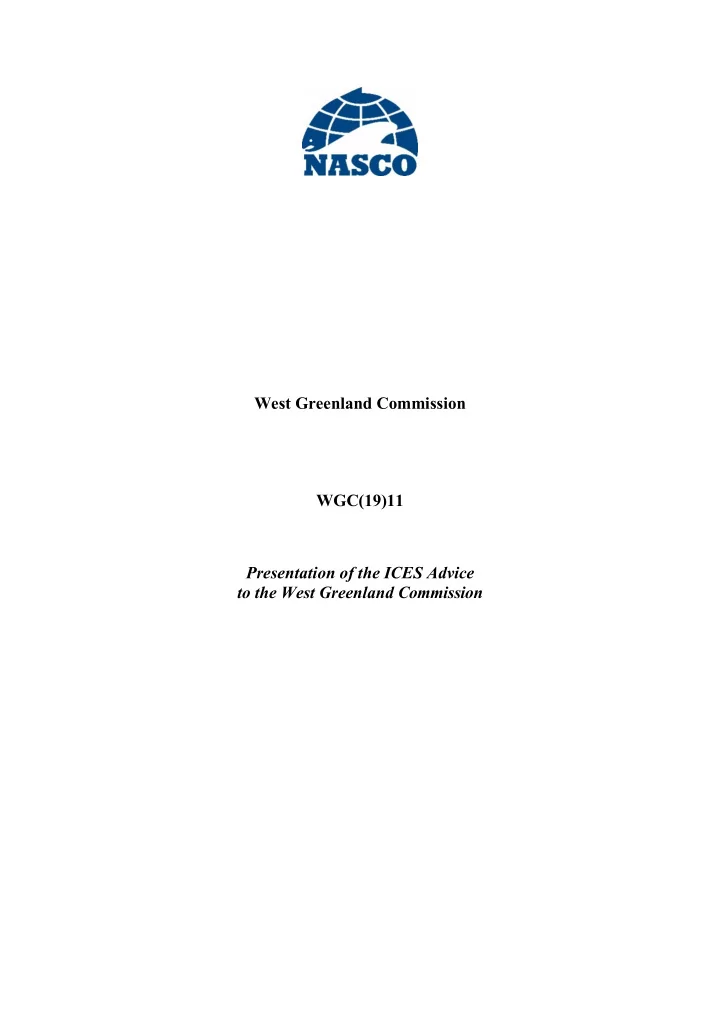

West Greenland Commission WGC(19)11 Presentation of the ICES Advice to the West Greenland Commission
sal.wgc.all Atlantic Salmon at West Greenland 1
Terms of Reference 4. With respect to Atlantic salmon in the West Greenland Commission area: 4.1 describe the key events of the 2018 fisheries; 4.2 describe the status of the stocks; The Framework of Indicators was applied in 2019 and there was no indication of underestimated abundance forecasts. Therefore, a full reassessment was not required in 2019 and the 2018 ICES advice remains valid. Consequently, there are no mixed-stock fishery options at West Greenland for the fishing years 2019 to 2020. 2
4.1 Key Events 2018 Fishery Figure 1: sal.wgc.all • 2018 quota was 30t ! Upernavik • Commercial fishery for internal use only (20t) 1A • Private fishery (10t) Uummannaq 0A Qeqertarsuaq • No sales to factories allowed Ilulissat Qasigiannguit Aasiaat Kangaatsiaq • All fishers required to have a license and mandatory Sisimiut 1B Sarfannguaq reporting requirements Kangaamiut Maniitsoq • Fishing season: 15 August to 31 October 1C Atammik Nuuk 0B 1D Qeqertarsuatsiaat Paamuit Ivittuut 1E Narsaq Arsuk ! Qassimiut ! Qaqortoq 1F Nanortalik 3
4.1 Key Events 2018 Fishery: Catch • Reported catch was 39.9 t • Unreported Catch • 12 t increase over 2017 • no quantitative approach • 82% for Commercial use (55% in 2017) • 10 t, previously reported by the Greenlandic authorities to account for private non-licensed fishers in smaller • 18% for Private use (45% in 2017) communities Table 3: sal.wgc.all 4
4.1 Key Events 2018 Fishery: Catch • 18.4 t of landings had been registered by the end of the fishery (31 October) • Catch later corrected to 39.9 t in March 2019, resulting in an overharvest of approximately 10 t • Catch peaked at approximately 2700 t in 1971 Figure 2: sal.wgc.all 5
4.1 Key Events 2018 Fishery: Phone Survey • Phone survey conducted after the fishing season from 2014 to 2016 resulted in adjusted landings from unreported catch: • 2014: + 12.2 t • 2015: + 5.0 t • 2016: + 4.2 t • 2017 phone survey conducted with 9 fishers: no adjustment made • No survey conducted in 2018 6
4.1 Catch: Continent of Origin • International sampling programme continued in 2018 • 1115 samples from four communities representing four of the six NAFO divisions • Continent of Origin: North American: 83% European: 17% Figure 3: sal.wgc.all 100% 90% 80% 70% 60% 50% 40% 30% European 20% North American 10% 0% 1982 1985 1988 1991 1994 1997 2000 2003 2006 2009 2012 2015 2018 7
4.1 Catch: Continent of Origin • Estimated number of salmon harvested Number of Salmon = Total Catch kg ÷ Average Weight of Individual Salmon Harvested kg • North American: • ~10600 (32.4 t) • European: • ~2600 (6.6 t) Figure 4: sal.wgc.all 8
4.1 Catch: Region of Origin Figure 5: sal.wgc.all • SNP Genetic Baseline • 31 Reporting groups • 21 North America • 10 European 9
4.1 Catch: Region of Origin • North American: • European: • 74% to 4 genetic reporting groups • 84% to UK and Ireland genetic reporting group • Gulf (GUL), Gaspe (GAS), Labrador (LAC and LAS) • 1 fish assigned to the Greenland genetic reporting group (Kapisillit River) 10
4.2 Status of Stocks: Risk Assessment Framework • Management advice for West Greenland fishery based on non-maturing 1SW salmon (return as 2SW/MSW) from North America (NAC) and Southern-Northeast Atlantic (S-NEAC) • Pre-Fishery Abundance (PFA) relative to Spawner Escapement Reserve (SER) • SERs - CLs adjusted for natural mortality (3% per month at sea) • Spawners (2 SW NAC and MSW S-NEAC) relative to Conservation Limits (CLs) • Full Reproductive Capacity : • lower bound of the 90% confidence interval of the estimate above reference point • equivalent to a probability of at least 95% of meeting reference point • At Risk of Suffering Reduced Reproductive Capacity: • lower bound of the confidence interval is below reference point, but the midpoint is above • Suffering Reduced Reproductive Capacity: • midpoint is below reference point 11
4.2 Status of Stocks: Pre-Fishery Abundance (PFA) Figure 6: sal.wgc.all Figure 7: sal.wgc.all • PFA estimates of non-maturing 1SW salmon suggest continued low abundance • North American: suffering reduced reproductive capacity • Southern-NEAC: suffering reduced reproductive capacity 12
4.2 Status of Stocks: Spawners Figure 8: sal.wgc.all • 2018 Spawners • Median estimate < CLs • 5 of 6 North American 2SW stocks • Southern-NEAC MSW stock Risk suffering reduced Suffering reduced Full reproductive reproductive capacity reproductive capacity capacity 13
4.2 Status of Stocks: Exploitation Rate • Exploitation rate = Greenland Catch ÷ Pre-Fishery Abundance (PFA) • North America: 6.7% Southern NEAC: 0.8% 2008-2017 • among lowest in time series (1971-2017) 10% North American European Exploitation rate 45% 40% 35% 5% 30% Exploitation rate 25% 20% 0% 15% 2008 2010 2012 2014 2016 10% Year 5% Figure 9: sal.wgc.all 0% 1971 1976 1981 1986 1991 1996 2001 2006 2011 2016 Year 14
4.2 Status of Stocks: Summary • Despite major changes in fisheries management in the past few decades and increasingly more restrictive fisheries measures, returns have remained near historical lows • It is likely, therefore, that other factors besides fisheries are constraining production. Photo by Nick Hawkins 15
Relevant data deficiencies, monitoring needs, and research requirements • Efforts to improve the reporting system of catch in the Greenland fishery should continue, while spatially and temporally explicit catch and effort data from all fishers should be made available for analyses. • The broad geographic sampling programme including in Nuuk (multiple NAFO divisions including factory landings when permitted) should be expanded across the fishing season to ensure that samples are representative of the entire catch. This will allow more accurate estimates of region of origin and biological characteristics of the mixed-stock fishery. 16
Photo by Nick Hawkins 17
Recommend
More recommend